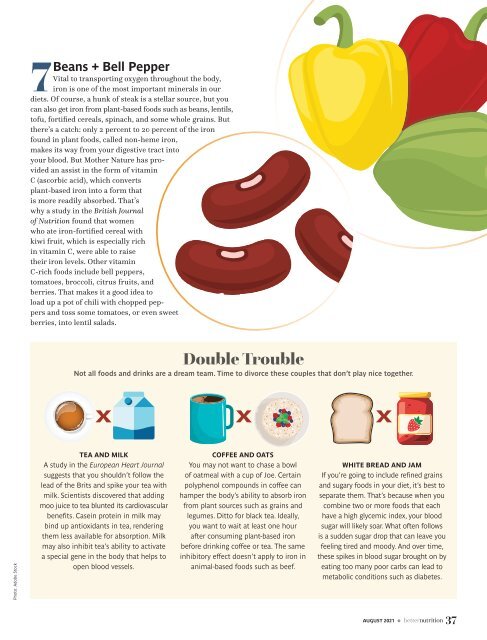BetterNutrition August 2021
Create successful ePaper yourself
Turn your PDF publications into a flip-book with our unique Google optimized e-Paper software.
7Beans + Bell Pepper<br />
Vital to transporting oxygen throughout the body,<br />
iron is one of the most important minerals in our<br />
diets. Of course, a hunk of steak is a stellar source, but you<br />
can also get iron from plant-based foods such as beans, lentils,<br />
tofu, fortified cereals, spinach, and some whole grains. But<br />
there’s a catch: only 2 percent to 20 percent of the iron<br />
found in plant foods, called non-heme iron,<br />
makes its way from your digestive tract into<br />
your blood. But Mother Nature has provided<br />
an assist in the form of vitamin<br />
C (ascorbic acid), which converts<br />
plant-based iron into a form that<br />
is more readily absorbed. That’s<br />
why a study in the British Journal<br />
of Nutrition found that women<br />
who ate iron-fortified cereal with<br />
kiwi fruit, which is especially rich<br />
in vitamin C, were able to raise<br />
their iron levels. Other vitamin<br />
C-rich foods include bell peppers,<br />
tomatoes, broccoli, citrus fruits, and<br />
berries. That makes it a good idea to<br />
load up a pot of chili with chopped peppers<br />
and toss some tomatoes, or even sweet<br />
berries, into lentil salads.<br />
Double Trouble<br />
Not all foods and drinks are a dream team. Time to divorce these couples that don’t play nice together.<br />
Photo: Adobe Stock<br />
TEA AND MILK<br />
A study in the European Heart Journal<br />
suggests that you shouldn’t follow the<br />
lead of the Brits and spike your tea with<br />
milk. Scientists discovered that adding<br />
moo juice to tea blunted its cardiovascular<br />
benefits. Casein protein in milk may<br />
bind up antioxidants in tea, rendering<br />
them less available for absorption. Milk<br />
may also inhibit tea’s ability to activate<br />
a special gene in the body that helps to<br />
open blood vessels.<br />
COFFEE AND OATS<br />
You may not want to chase a bowl<br />
of oatmeal with a cup of Joe. Certain<br />
polyphenol compounds in coffee can<br />
hamper the body’s ability to absorb iron<br />
from plant sources such as grains and<br />
legumes. Ditto for black tea. Ideally,<br />
you want to wait at least one hour<br />
after consuming plant-based iron<br />
before drinking coffee or tea. The same<br />
inhibitory effect doesn’t apply to iron in<br />
animal-based foods such as beef.<br />
WHITE BREAD AND JAM<br />
If you’re going to include refined grains<br />
and sugary foods in your diet, it’s best to<br />
separate them. That’s because when you<br />
combine two or more foods that each<br />
have a high glycemic index, your blood<br />
sugar will likely soar. What often follows<br />
is a sudden sugar drop that can leave you<br />
feeling tired and moody. And over time,<br />
these spikes in blood sugar brought on by<br />
eating too many poor carbs can lead to<br />
metabolic conditions such as diabetes.<br />
AUGUST <strong>2021</strong> • 37

















